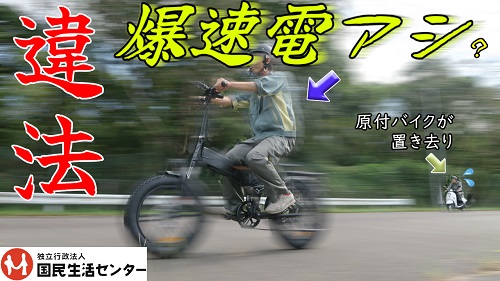Beware of non-compliant power-assisted bicycles! Riding such bicycle may violate the Road Traffic Act and cause accidents
A power-assisted bicycle has a mechanism where an electrical motor assists pedaling. According to the Ordinance for Enforcement of the Road Traffic Act, power-assisted bicycles are allowed on the road only if: pedaling is required for moving; assist power is no more than twice of human power; and the assist function ceases when the speed exceeds 24 km/h.
There was an accident of a non-compliant power-assisted bicycle. A person rode a non-compliant power-assisted bicycle and collided against another bicycle. The rider was convicted. In addition, a company which sold non-compliant power-assisted bicycles exceeding the standard assist ratio was taken into custody.
Therefore, NCAC decided to examine ten power-assisted bicycles sold on a major shopping site to find out if they meet the legal standard and to provide consumers with related information.
Video

Beware of non-compliant power-assisted bicycles! <Dangerous> Riders are penalized!(YouTube)
Test results
- Nine out of ten products exceeded the upper limit for the assist ratio set by the Road Traffic Act. Six out of the nine products largely exceeded the upper limit and accelerated to a certain speed scarcely requiring human power.
- Five out of ten products had an embedded throttle-like device. Two out of the five products gained speed when operated, which were considered non-compliant with the standard.
- Seven out of ten products had a function similar to a walk assist function. All the seven products activated the function when riding, which were supposed to be non-compliant with the standard.
Labeling and representation
- All the brands state or imply on the shopping site that on-the-road riding as a bicycle is allowed.
- Instruction manuals of three brands state the setting speed to cease the assist function as above 24km/h and how to change the setting speed.
- A battery and a battery charger were attached with all the products. Seven out of the ten products did not correctly display the mark of conformity to the requirements of the Electrical Appliances and Materials Safety Act (e.g. PSE mark).
Advice for consumers
- If you have any power-assisted bicycle which does not or may not comply with the standard in the Road Traffic Act, refrain from riding the bicycle on the road and ask your seller or manufacturer what to do.
- When buying a power-assisted bicycle, refer to the aforementioned test results and choose one with a type-approval mark (e.g. TS mark, BAA mark) as much as possible.
- Power assisted bicycles may not meet the standard in the Road Traffic Act if: the setting speed to cease the assist function can be changed; or specifications can be changed from throttle operated to power assisted. Inquire your seller or manufacturer to make a careful choice.
Request to businesses
- Properly inform consumers and address their requests regarding power-assisted bicycles which do not meet the standard in the Road Traffic Act (e.g. consultation service, recall service for interested consumers).
- Improve confusing ad messages for non-compliant power-assisted bicycles as if they can be ridden on the road, in order not to mislead consumers.
- Properly manufacture, import and sell accessories following related laws and ordinances.
Request for cooperation to online shopping mall operators
- Please request sellers: to follow related laws and ordinances and properly manufacture, import and sell products including accessories; and to make ad messages clear so that consumers can choose products they want.
Request to the government
- Keep consumers informed about non-compliant power assisted bicycles which do not meet the standard in the Road Traffic Act and may not be ridden on the road.
- Further instruct consumers to refrain from using non-compliant power-assisted bicycles whose assist power ratio exceeds the standard, in order to prevent traffic accidents and consumer damage.
- In Japan, batteries and battery chargers are subject to the Electrical Appliances and Materials Safety Act. However, some batteries and battery chargers sold as accessories are not properly labeled as specified in the act. Instruct those manufacturers, importers and sellers to follow related laws and ordinances.
